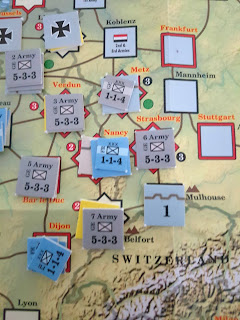Another week, and another Wars of the Roses battle using Never Mind the Billhooks. We're working our way through the major battles and have reached Northampton (I missed Blore Heath). Much as I love Billhooks I've yet to actually win a game... would Northampton be my turning point?
As usual there is an excellent write up of the background and rule amendments on Eric the Shed's blog HERE, along with a write up of the game. The short version is that the plucky Lancastrians (me and John) are holed up with the King in a fortified camp, secure in the knowledge that those pesky Yorkists (Eric and Mark) won't be able to breach the defences. Of course, this being the Wars of the Roses, treachery is never far away and Lord Grey on the Lancastrian right is wavering in his loyalty (or has already sold out his allies).
 |
The calm before the storm
|
The rule changes we were using meant that Grey's loyalty would be determined when Yorkists troops reached the embankment and defences, but could be influenced by the presence of leaders.
The battle was opened by a Papal Legate excommunicating the Lancastrians which had little effect on the army (we lost 1 morale counter...could have been worse). We decided the Lancastrians obviously had a high number of Lollards in their ranks.
 |
| Excommunicating the heretics! |
The battle took place in a downpour and we had some rule changes to account for that... as the game progressed the rain steadily increased meaning our artillery and archers were unable to fire and allowed the Yorkists to approach safely. Thankfully the clouds parted and the rain stopped before they were able to cross the defences and our archers quickly loosed arrows all along the line.
 |
| The Yorkists approach the defences |
On the Lancastrian left John's archers caused heavy casualties to the approaching Yorkists (along with a small and very annoying unit of skirmishers which had arrived on a bonus card). The Yorkists attack stalled and blocks of troops reeled back from the embankment.
 |
The artillery was rubbish but at least it didn't explode!
|
On my side the battle was less frantic. Essex was leading the Yorkists approaching Grey but didn't actually attack until they'd had a chance to talk and try and get Grey to defect. Both sides had moved their commanders close to the wavering faction to try and influence the die roll... all I had to do was not roll a 5 or 6. Of course saying that out loud is the wargamers curse and, sure enough I rolled a 5.
 |
Grey's men turn round to face their former friends
|
Each of Grey and Catsby's units had to test and a couple decided to run off rather than actually switching sides, but this still left a significant force sitting on my flank.
The next Lancastrian lord, Beaumont, led the fight back against the treacherous Grey, swinging some Billmen and Men at Arms round to face the new enemies before charging in. This fight was actually very close, fought over several rounds but ultimately there were too many Yorkists pouring in and eventually Beaumont was routed. There was some satisfaction in Grey being wounded in the fight though.
 |
..and Beaumont's men attack the traitors.
|
This now left our right flank pretty open (just as in the historical battle). At the other end of the table John and Eric had been fighting out a ferocious battle with the Yorkists struggling to get over the defences and the morale tokens were changing hands back and forwards every turn. Eventually the numbers were proving too great and a routing Men at Arms unit tipped the balance, causing a series of routs and the last of our morale counters to go. History had held out once again!
 |
The Men at Arms are peppered with arrows
before being charged and routing |
So, still no Billhooks victory for me but another great game using these rules. Although they were designed as a 'large skirmish' set of rules I think we've been stretching them well beyond that and they still hold up really well. We did take away some useful points from this game: we'd been making a bit of an error with combined blocks of troops and now we've found that having these large units is a bit risky. The Yorkists had to spend a lot of time breaking up the formations into separate units to prevent too many losses. We also started using commanders differently: in previous games we've been quick to throw them into combat but we've learned that they need to be unattached to sort out rallies and reorganisation... if your leaders are too busy enjoying themselves battering their enemies the rest of the army becomes paralyzed very quickly.
Next week we're off to Wakefield....will I finally get a win??































